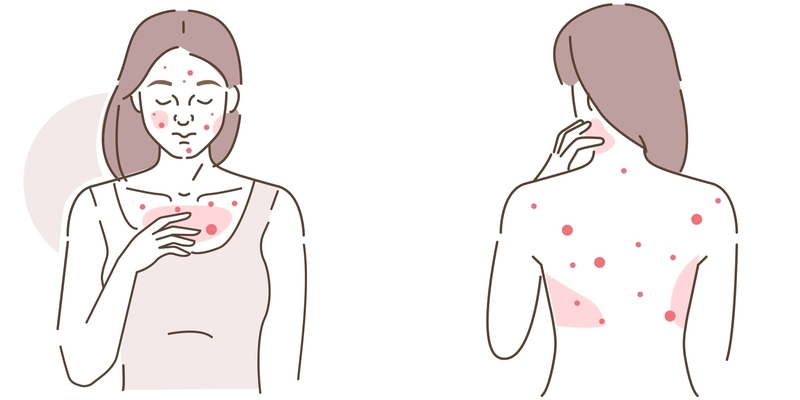Sensitive Skin Syndrome is a common, yet often misunderstood condition that affects a significant portion of the population worldwide. Characterized by heightened skin reactivity and a susceptibility to various environmental factors, this syndrome can manifest through a range of symptoms including redness, itching, and burning sensations. In this comprehensive guide, we'll unravel the enigma surrounding Sensitive Skin Syndrome, exploring its potential causes, identifying its symptoms, and navigating through the efficacious treatments available to manage this condition. Join us as we demystify this intricate syndrome, aiming to provide relief and improve the quality of life for those affected.
Understanding Sensitive Skin Syndrome:
Sensitive Skin Syndrome, also known as Sensitive Skin Disorder or Reactive Skin Disorder, is a multifaceted condition that can manifest in anyone, regardless of age or gender. It is often accompanied by skin conditions such as eczema, rosacea, and contact dermatitis, which can exacerbate the skin's sensitivity and reactivity. While some individuals may have been born with a predisposition to this condition, others may develop it over time due to various factors such as genetics, lifestyle choices, and environmental triggers.
Symptoms of Sensitive Skin Syndrome:
Sensitive Skin Syndrome can present in a variety of ways, making it challenging to diagnose and treat effectively. Some common symptoms include:
- Redness or flushing
- Itching and burning sensations
- Dryness and flakiness
- Breakouts or acne-like bumps
- Tingling or prickling feeling on the skin
While these symptoms may vary from person to person, they can significantly impact an individual's quality of life and self-esteem. It is crucial to pay attention to these symptoms and seek professional advice if they persist or worsen over time.
How symptoms impact daily life?
Sensitive Skin Syndrome can have a profound impact on an individual's daily life, both physically and emotionally. The constant discomfort and self-consciousness caused by visible symptoms can lead to social anxiety and a decrease in confidence. Additionally, the need for specialized skincare products and avoidance of certain triggers may also affect one's lifestyle choices and routines. It is essential to address these impacts and seek support from healthcare professionals and loved ones to manage the condition effectively.
Causes of Sensitive Skin Syndrome:

The exact cause of Sensitive Skin Syndrome is unknown, and it may vary from person to person. However, some potential factors that may contribute to this condition include:
- Understanding genetic predisposition: Research has shown that genetics may play a significant role in the development of Sensitive Skin Syndrome. Individuals with a family history of this condition are more likely to inherit it, making them more prone to experiencing heightened skin reactivity and sensitivity. While this cannot be changed, being aware of this predisposition can help in avoiding triggers and managing the condition effectively.
- Environmental factors and their influence on Sensitive Skin Syndrome: Sensitive Skin Syndrome is often triggered by external factors, particularly environmental ones. Pollutants, weather changes, and allergens can cause inflammation and irritation on the skin, leading to symptoms associated with this syndrome. It is essential to be mindful of these triggers and take necessary precautions to protect the skin from their effects.
- Skincare products and their role in Sensitive Skin Syndrome: The use of harsh ingredients or improper skincare routine can aggravate symptoms associated with Sensitive Skin Syndrome. It is essential to choose gentle, fragrance-free products specifically formulated for sensitive skin to avoid further irritation. Additionally, patch testing new products before use can help identify any potential allergens or irritants.
- Underlying skin conditions and their impact on Sensitive Skin Syndrome: Sensitive Skin Syndrome is often accompanied by underlying skin conditions like eczema, rosacea, and contact dermatitis. These conditions can further increase the skin's sensitivity and reactivity, leading to more severe symptoms. It is crucial to address these underlying conditions to effectively manage Sensitive Skin Syndrome.
It is essential to identify and manage these potential causes to alleviate symptoms and prevent future flare-ups.
Types of tests and evaluations:
A dermatologist may perform various tests and evaluations to diagnose Sensitive Skin Syndrome, including:
- A visual examination of the skin and symptoms
- Patch testing to identify potential allergens or irritants
- Blood tests to rule out underlying conditions
- Phototesting to determine the effects of sunlight on the skin
These tests can help pinpoint the causes and triggers of Sensitive Skin Syndrome and aid in developing an effective treatment plan.
Treatment Options for Sensitive Skin Syndrome:
While there is no cure for Sensitive Skin Syndrome, various treatment options can help manage symptoms and improve the overall condition of the skin. These may include:
- Avoiding triggers: As sensitive skin is triggered by external factors, it is essential to identify and avoid these triggers to prevent flare-ups. This may include using gentle skincare products, avoiding harsh chemicals or fragrances, and protecting the skin from environmental factors.
- Topical treatments: Depending on the severity of symptoms, a dermatologist may prescribe topical medications like corticosteroids or antibiotics to alleviate inflammation and irritation. These can help in managing symptoms and preventing further damage to the skin.
- Oral medications: In some cases, oral medications may be necessary to treat underlying conditions or severe symptoms associated with Sensitive Skin Syndrome. These may include antihistamines, antibiotics, or immunosuppressants.
- Skin care routine and lifestyle changes: In addition to medical treatments, maintaining a consistent skincare routine and making necessary lifestyle changes can also help manage Sensitive Skin Syndrome. This may include using gentle cleansers, moisturizing regularly, avoiding hot water, and protecting the skin from harsh weather conditions.
It is essential to consult with a healthcare professional to determine the best treatment plan for managing Sensitive Skin Syndrome effectively.
Living with Sensitive Skin Syndrome:

While living with Sensitive Skin Syndrome can be challenging, it is possible to lead a fulfilling life by understanding the condition and taking necessary precautions. Here are some tips for managing this syndrome:
- Stay informed: Educate yourself about triggers, potential causes, and treatment options for Sensitive Skin Syndrome. This knowledge can help in making informed decisions and avoiding further irritation.
- Choose the right products: Opt for skincare products specifically formulated for sensitive skin. Avoid harsh chemicals and fragrances and always patch test new products before use.
- Protect your skin: Protect your skin from environmental factors by wearing sunscreen, protective clothing, and avoiding extreme weather conditions.
- Be consistent with your routine: Consistency is key when it comes to managing Sensitive Skin Syndrome. Stick to a skincare routine and make necessary lifestyle changes to keep symptoms under control.
- Seek professional help: If you experience severe or persistent symptoms, consult with a dermatologist for proper diagnosis and treatment. They can also provide guidance on managing underlying conditions that may contribute to Sensitive Skin Syndrome.
By understanding the causes, getting a proper diagnosis, and following an appropriate treatment plan, it is possible to effectively manage Sensitive Skin Syndrome and improve the overall health and appearance of your skin.
Conclusion:
Sensitive Skin Syndrome is a common but often misunderstood skin condition. It is essential to educate yourself about this syndrome and its potential triggers, as well as seek professional help for proper diagnosis and treatment. By taking necessary precautions, avoiding triggers, and following an appropriate treatment plan, it is possible to manage Sensitive Skin Syndrome effectively and lead a fulfilling life with healthy, happy skin.







